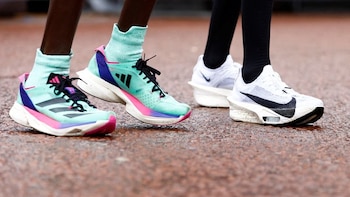
(ATR) FINA executive director Cornel Marculescu says doping is a "war we will never win" as the federation ramps up its drug testing program in the run-up to Rio 2016.
A series of doping scandals involving swimmers from Russia and China have increased the scrutiny on swimming and FINA’s anti-doping system and raised fears for the Olympics.
Last week, FINA rejected an appeal by Russian swimmer Yulia Efimova to lift the provisional suspension handed down by the Russian Swimming Federation in March for failing a doping test for meldonium. It was the latest in a string of Russian doping cases. In March, British newspaper The Times alleged that doping positives involving six Chinese swimmers were covered up.
Two water polo players and two swimmers have so far failed tests for meldonium, according to Marculescu.
"I think it’s a war we will never win but it’s a battle we will win here and there for sure. We have cases and we are continuing to look at them," Marculescu told a media briefing at the SportAccord Convention in Lausanne. He spoke of "some doping cases" in China and referred to "another big issue is Russia".
"I don’t think today from what I know we are faced with systematic doping."
An unnamed independent expert involved in the Lance Armstrong case has been appointed to audit FINA’s anti-doping procedures. The cyclist was stripped of his seven Tour de France titles after admitting to doping for years.
After several months of evaluation, the doping expert will report back to FINA’s Aug. 5 meeting in Rio de Janeiro.
Marculescu said it would reveal whether improvements were needed. "We are open to anything," he said.
In tandem with the anti-doping study, the consulting company run by former IOC director general Francois Carrard is reviewing the management and operations of FINA "to see how we are doing on governance and transparency". Carrard’s recommendations for change will go before the FINA Congress in 2017.
Marculescu said swimmers competing at the Rio Olympics will be tested between five and seven times in the buildup to the Games.
FINA is spending up to $2 million on anti-doping procedures in 2016, an increase on the $1-1.5 million normally spent on an annual basis, he confirmed.
"We continue to do our program as strongly as possible. We spend whatever money is necessary to spend and we apply our rules without any kind of limitation."
Marculescu said he doesn’t expect "any big [doping] stories" at the Olympics, "I hope not".
Commenting on the water quality for the Olympic marathon swimming events at Copacabana, he said analyses were being conducted every two or three weeks and current standards were up to international regulations.
Reported by Mark Bissonin Lausanne
20 Years at #1: Your best source of news about the Olympics is AroundTheRings.com, for subscribers only.
Últimas Noticias
Utah’s Olympic venues an integral part of the equation as Salt Lake City seeks a Winter Games encore
Utah Olympic Legacy Foundation chief of sport development Luke Bodensteiner says there is a “real urgency to make this happen in 2030”. He discusses the mission of the non-profit organization, the legacy from the 2002 Winter Games and future ambitions.

IOC president tells Olympic Movement “we will again have safe and secure Olympic Games” in Beijing
Thomas Bach, in an open letter on Friday, also thanked stakeholders for their “unprecedented” efforts to make Tokyo 2020 a success despite the pandemic.

Boxing’s place in the Olympics remains in peril as IOC still unhappy with the state of AIBA’s reform efforts
The IOC says issues concerning governance, finance, and refereeing and judging must be sorted out to its satisfaction. AIBA says it’s confident that will happen and the federation will be reinstated.

IOC president details Olympic community efforts to get Afghans out of danger after Taliban return to power
Thomas Bach says the Afghanistan NOC remains under IOC recognition, noting that the current leadership was democratically elected in 2019. But he says the IOC will be monitoring what happens in the future. The story had been revealed on August 31 in an article by Miguel Hernandez in Around the Rings

North Korea suspended by IOC for failing to participate in Tokyo though its athletes could still take part in Beijing 2022
Playbooks for Beijing 2022 will ”most likely” be released in October, according to IOC President Thomas Bach.




